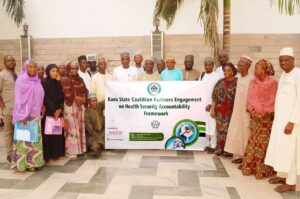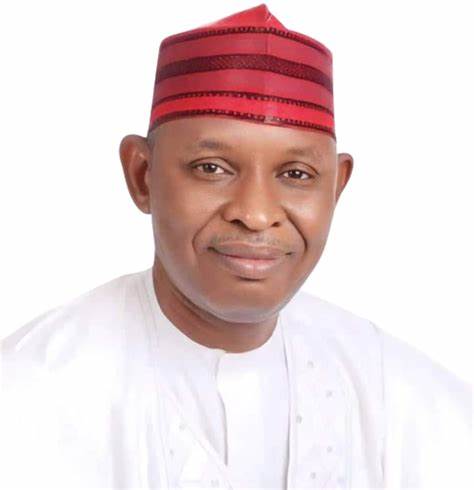A non-profit organization, Network for Health Equity and Development (NHED), has urged Governor Abba Kabiru Yusuf of Kano to assent and implement the Kano Health Security Bill recently passed by the state House of Assembly.
Grassroots Parrot reports that the bill encompasses various aspects of public health, including surveillance, management of emergencies, infection prevention and control, and the protection of health care workers.
NHED’s Communications Focal Person, Tessy Nongo Maina, made the appeal in Kano on Tuesday at a stakeholder meeting for the Kano State Health Security Accountability Framework to strengthen the health security system in the state.
Maina noted that the bill had been passed since 2023 with amendments made by the governor and returned to the house.
“There have been several follow-up conversations—amendments that needed to have been made—and the governor had seen that amendment and made his input and sent it back to the house. All the other processes have been done and brought back to the table of the executive governor.
“Whatever needs to be done still needs to be dug out from his table so that if the timeline has passed (for the assent), the process needs to be brought back to view,” she said.
READ ALSO: Emirship Tussle: Kano Assembly Passes Second-Class Emirates Bill
Acknowledging that Kano outshines other states in terms of emergency response, Maina stressed that the state is nowhere near global best practices according to a Joint External Evaluation for Health Security report, which puts Kano’s health security at 46%—below average for emergency preparedness.
“Kano State is nowhere near the standard of global best practices; that’s why we are still having issues of outbreaks. When there is an outbreak, there is always a willingness to quickly curb it, but how about building systems to ensure that it doesn’t come up?
“Kano is following closely with what the country is doing, but we are not there yet!” She added.
Main also advocated for the assent of a bill to guide operations of the already established Kano State Centre for Disease Control (CDC), which is a major custodian of health security in the state.
According to her, the bill, if assented to, would facilitate the coordination and strategic planning during emergency situations.
“A major custodian of health security at the national level is the NCDC, so at the state level, we have that CDC office, but how much power will the person be said to have if the legal framework for empowering him has not been signed?”.
She also harped on accountability for funds allocated into health security, no matter how little.
According to her, Kano State has a budget for epidemic preparedness (EPR), of which N300 million was initially allocated; however, there are concerns about the utilization of even the little amount disbursed.
She believes “Kano State does not have a problem with budgetary allocations, but where you have challenges is in releases, and even with the little releases, we have challenges with utilization because there is no state-agreed system to track these expenditures.”
Maina further called for the implementation of the state’s action plan for health security to be able to track and align it with the financial commitment.
READ ALSO: How Health Workers Conniving With Patients To Steal Drugs At Kano Hospitals – Commissioner
On her part, NHED Program Officer Oluwatoyin Adeomi recommended that the state government should adopt state inter-sectoral meetings where salient issues like health security could be addressed.
According to her, Kano State had adopted a sector-wide approach in the health sector; hence, she stressed the need for the health security agenda to be part of their inter-sectorial coordination meeting.
“We want the agenda on health security to be part of that SWAP (sector-wide approach) so that when they go for meetings they can always discuss health security in the state, especially on what has been expended and utilized.
“We want the state government to take ownership of the health security framework and institutionalize it across the Ministries, Departments, and Agencies (MDAs) to track the health security budget in order to showcase that there is a system that works in Kano for anybody to key into and take it further.” She said.
In their separate remarks, some participants at the stakeholders meeting, including directors from Ministries of Health, Budget, and Planning as well as the Kano State Bureau of Statistics and other MDAs, identified a lack of synergy on data sharing among MDAs as a major challenge in tracking budget performance.

READ ALSO: INVESTIGATION: Pregnant Women ‘Die Monthly’ In Kano Community Despite Modern Healthcare Facility
While appreciating NHED’s kind gesture for its various initiatives gearing towards championing the health security campaign, they recommended more training and retraining of MDAs’ top officials to boost the health security outcomes, especially on transparency and accountability.
Meanwhile, NHED also extended the advocacy of health security to the media industry on Wednesday, where it emphasized how the delay in the assent and implementation of the bill cold further threaten public health in Kano.
NHED’s communications focal person insisted that the delay in actualizing the health security law would negatively impact the prevention, detection, and swift response to epidemic and disease outbreaks in the state.
She tasked the state government to revisit the 2022-2026 action plans, adding that Kano journalists should also use their platforms to demand accountability for all the funding being put into health security in the state.

